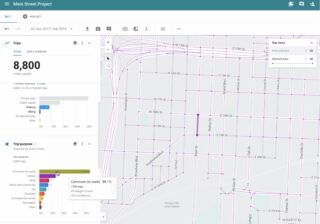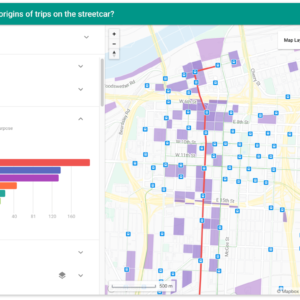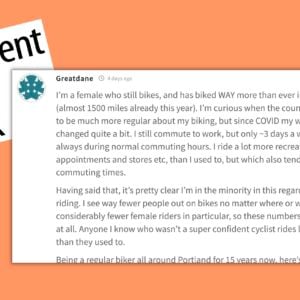
A data project billed as the “next generation urban planning tool” that involved over two years of negotiations between Metro, TriMet, the City of Portland, and Google-owner Alphabet has crashed-and-burned.
On Saturday, Red Tail Media reported that a contract between Metro and Sidewalk Labs to develop the Replica tool for regional use been officially terminated. “A city tech project in Portland with the Sidewalk Labs spin-off leads to accusations, data disputes and ‘damaged trust'” reads the headline, which was then picked up by the BBC on Tuesday.
Quick background:
In December 2018, Portland City Council adopted an intergovernmental agreement to embark on the ambitious, 12-month project with a budget of $457,300. “This tool can fundamentally change the game for us,” a PBOT staffer said at the council hearing. Former Portland Bureau of Transportation Commissioner Chloe Eudaly was “very excited” about it: “The more information we have about how, when, and why our streets being used, the better we are able to plan for and accommodate those demands and make our city work better for everyone.”
Advertisement
The project was specifically intended to improve counting of bike riders, walkers, and micromobility users. The lack of data for these modes (compared the precise numbers we have for transit and car users) puts them at a severe disadvantage for government funding.
Here’s a snip from Red Tail Media reporter Kate Kaye:
A couple things really got [Metro Senior Technology Strategist Eliot] Rose and the Metro crew excited about Replica. One was the ability to gauge movement patterns of people on bikes, scooters or on-foot rather than more-readily tracked cars and public transportation. The other: the promise of predicting how traffic or public transportation decisions might affect the BIPOC community or other vulnerable residents….
But by August 2020, Metro decided Replica had failed to meet its acceptance criteria. So, Replica proposed to alter that criteria. But Metro didn’t like the idea much.
“Based on what you’re proposing, we don’t feel like we can rely on Replica as a source of bike/ped [pedestrian] data, as an input to our travel model, or as a tool for detailed equity analyses – all of which are central to our use cases and to the reasons why we chose to pursue this partnership in the first place,” Rose told Ahern, the Replica customer rep.
Essentially, said Ahern, Replica didn’t get enough of that data from Metro. “While Portland is unfortunately not unique in its limited ground-truth for bike and pedestrian data, it’s worth noting that we were only supplied with seven (7) bike sensors and pedestrian counts that only included 2 hours worth of counts per location/day,” wrote Ahern at the time to Rose and other Metro staff, cc’ing Bowden.
Read more of Kaye’s excellent and in-depth reporting here.
This is an unfortunate turn of events and it’s not yet fully clear how this impacts Metro’s planning work. Being able to analyze bike/walk/scooter traffic is absolutely imperative to making funding and planning decisions and without these numbers we’ll continue to be in the dark and our models won’t allow these modes to compete with cars and transit.
I’ll follow up with Metro and report back. Stay tuned.
— Jonathan Maus: (503) 706-8804, @jonathan_maus on Twitter and jonathan@bikeportland.org
— Get our headlines delivered to your inbox.
— Support this independent community media outlet with a one-time contribution or monthly subscription.







Thanks for reading.
BikePortland has served this community with independent community journalism since 2005. We rely on subscriptions from readers like you to survive. Your financial support is vital in keeping this valuable resource alive and well.
Please subscribe today to strengthen and expand our work.
Just my two cents, but it seems like cameras and the cloud could do the same work full time for pennies on the dollar (no pun intended). I’d be surprised if Kroger isn’t already doing this with its parking lot security cameras at Fred Meyer.
Sure if there were staff to maintain it and maintain documentation on the accuracy of different deployed systems so they could be accurately compared. There’s also hundreds of existing inductive loops at signals that have data but no staff to maintain that information in any automated or aggregate fashion. Every signal timing engineer in the Metro Region maintains 100+ signals which really limits what is possible.
I haven’t heard anything about the parking lots, but once you step into a store you’re added to an algorithm that, combined with knowing average shopping times, lets managers know how many open registers they’ll need by the time you’re likely to be checking out.
This is very disappointing. From my understanding, Replica/nee Sidewalk Labs gathers GPS track data on enough phones to make a representative sample. It is a parallel sample to Strava Labs data, though that data is criticized by PBOT as not being equitably representative of the population as a whole, but instead being representative of people who bought Fitbits, other GPS health trackers, and phones with Strava data-gathering apps.
One would expect Replica gathers track data, fuzzes it in time and trip endpoints, then builds a model. The city/county/Metro would run the model against closures, adding capacity, or reducing capacity. It could show the bikes per time interval on every street in the city, as well as trails, informal trails, and where sidewalks are needed. For large employers, it could model options for transit or staggered work times on personal vehicle bottlenecks. It could tell us what endpoints are using bottlenecks, like our bridges, at peak times. It could model tolling options.
Conventional methods of getting at bike and ped data are very poor, and vehicle and transit data is poor.
It seems odd that the point of dispute is revealing individuals’ private data to Metro.
I think its ironic that Metro is complaining about data access, when they themselves charge the public an exorbitant amount of money for access to their raw GIS data. I’ve been studying PNW GIS data for 20 years now.
I’m glad we are having this conversation about bicycling data. We don’t need that data to advocate for bicycling and walking facilities because we know its the right thing to do. Bikes are the most efficient form of transportation. And no we don’t need a bunch of high tech gadgets or microchips to work properly or to protect Black and brown people from getting hurt on the streets. Fine people with a DUI equivalent charge for hitting a walker or cyclists. Mega-fines, loss of license, increased insurance rates and potential jail time worked for DUI rates reductions. The same enforcement levels should be applied to car violence.
We should stop waiting for a technological miracle. There are none. Blowing up a mountain to mine Lithium for electric batteries is the same as blowing up a mountain for coal.
It’s our duty and obligation to stand up and get the walking and cycling facilities we need without Google/Replica databases. We need our policy advisors to be leaders and advocates. Stop hiding behind “lack of data”.
It’s too expensive to collect that level of data, impacts privacy and doesn’t tell us anything more then we already know about the benefits of cycling. Furthermore this type of data will never tell us about BIPOC concerns as pedestrians. Policy advisors who are shaking in their reports about BIPOC concerns should shift focus from data collection to policy implementation. POC aren’t reading your reports. We want safe streets and funding for bike lanes. We don’t care about your trip counts.